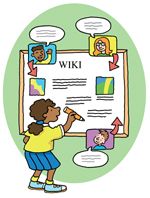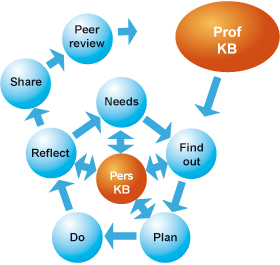Use 'Print preview' to check the number of pages and printer settings.
Print functionality varies between browsers.
Printable page generated Thursday, 5 February 2026, 12:06 PM
V08p: Sharing ideas: introducing wikis
Course information

You will need access to:
- a computer with a web browser
- a class/group of students – groups could be within classes, whole classes or groups across classes (e.g. clubs) and schools (e.g. collaborative projects across schools).
Duration of the course: 5.5 hours (including a 2 hour face-to-face session with a facilitator) over six weeks
- Online total: 2.5 hours
- independent study:1 hour (e.g. course preparation, reflection)
- collaborative: 1.5 hours (e.g. forum discussion, posting reflective experience)
- Offline total: 3 hours
- face-to-face: 2 hours
- workplace: 1 hour (planning a wiki-based collaborative activity for your learners).
Learning outcomes
Professional and reflective practitioner skills
At the completion of this course, you should be able to:
- identify opportunities for groups of learners to contribute to a class wiki
- consider how wikis may be used in other contexts to encourage learners to contribute to a suitable learning activity.
Practical skills
At the completion of this course, you should be able to:
- create a wiki page
- make use of wikis that are already available on your school VLE or learning platform.
Knowledge and understanding
At the completion of this course, you should be able to:
- recognise how a wiki can be used to encourage learners to contribute to a class project
- understand how to support learners in a wiki-based activity by providing ground rules and making all learners feel able to add to the wiki.
Cognitive skills
At the completion of this course, you should be able to:
- critically assess the use of wikis as a tool for primary learners to contribute to a shared activity
- discuss the issues around codes of conduct for wiki contributions.
Course schedule
| Week | Activities | Type | Duration |
| 1 | Activity 1 What are wikis? | Online | 30 minutes |
| Activity 2 An example of a primary school wiki | Online | 30 minutes | |
| 2 | Facilitated session | Face-to-face | 2 hours |
| 3 – 5 | Activity 3 Reflecting on the course so far | Online | 30 minutes |
| Activity 4 Planning activities for a primary school or class wiki | Workplace | 1 hour | |
| 6 | Activity 5 Extracting our shared learning | Online | 30 minutes |
| Activity 6 Course evaluation | Online | 30 minutes | |
| Total 5.5 hours |
Introduction

This course introduces the use of wikis to support learners in collaborative activities. Open source wiki software will be demonstrated, with ideas for projects that are suitable for primary aged learners. Recently published research that has looked at the use of web 2.0 tools in schools, including wikis, will be considered to help identify barriers to full participation by all learners in collaborative wiki-based activities. This course is an introduction for making quite basic use of a wiki. If you would like to understand more about the versatility of wikis, including adding images, uploading video and other media, look at the Learning together: developing wikis (V01s) online course.
The reflective cycle
Vital courses are based on a cycle of professional reflective practice as shown in the diagram below.

This cycle draws on, and develops, personal and professional knowledge bases. The latter may be seen in the literature, resources, policies and other materials that are used to inform practice.
Throughout the course small icons will indicate the stage of the cycle being addressed.
NB Prof/Pers KB = Professional/Personal knowledge base.
Preparation for face-to-face session

This preparation will take around 1 hour. These activities are intended to give you an overview into the use of wikis, including their advantages and disadvantages. The activities will be addressed by the course facilitator at the beginning of the face-to-face session.
 Activity 1 What are wikis?
Activity 1 What are wikis?
The objectives of this course activity are to:
- become more familiar with wikis
- understand the role of wikis in supporting collaboration in learning.
Before the facilitated session, read the Educause document ‘7 things you should know about wikis’
Reflect on the sections ‘Why is it significant?’ and ‘What are the downsides?’ Think about the points raised in these sections and how you might address them. For example what safeguards you may have to think about to ensure any wiki space works effectively and safely. Make some notes that include opportunities or concerns you have identified around the use of wikis with your learners from your reading so far.
 Activity 2 An example of a Primary school wiki.
Activity 2 An example of a Primary school wiki.
The objective of this course activity is to browse an example of a Primary school wiki to see the range of content included and individual pages created and edited by individual learners.
Go to http://www.sandaigprimary.co.uk/ wiki which is a wiki created by a Primary school in Glasgow, Scotland. Browse this wiki, scrolling down to look at the Year 6 projects featured. Individual learners have their own pages, which you can find by clicking on a project link and then on individual learners’ names. Are you surprised to see this amount of content in a primary wiki? Reflect on whether your primary learners could contribute to a similar resource and whether any projects planned for the coming school year could be displayed in a similar way to the work produced by Sandaig Primary School. Add to your notes any thoughts you have about creating a similar wiki site with your learners.
Information about the face-to-face session
You will have received information about the venue and time of the face-to-face component of this course. You will have two hours with a facilitator and other participants during which you will be shown examples of open source wiki software and have opportunity to edit wiki pages within the Vital website. Examples of the use of wikis will be demonstrated, together with ideas for how primary learners can contribute to a wiki to display their project work or to work together on collaborative projects. The course forum will open when this session is completed.
Following the face-to-face session

 Activity 3 Reflecting on the course so far
Activity 3 Reflecting on the course so far
The objectives of this course activity are to:
- make contact with participants of the face-to-face
- share ideas emerging from the course so far.
As explained by your facilitator in the face-to-face session, the course forum is available to all participants in the course after the end of the two hour facilitated session.
Go to the forum and post a message to the other participants. You may wish to reflect on the course so far, or post some ideas that have emerged from your planning of how to use a wiki with your learners
 Activity 4 Planning activities for a primary school or class wiki
Activity 4 Planning activities for a primary school or class wiki
The objective of this course activity is to make use of some of the ideas shared in the face-to-face session together with your reading to think about how you would create a school or class wiki and how learners would contribute to it.
The face-to-face session introduced some ideas for how primary schools use a wiki. You may have already thought of some activities that your learners could engage with that will allow them to contribute to either a school or class wiki. Think now about how you would create a wiki and whether it would be for a small group, a class or the whole school. You might want to focus on a few learners, and have a lunchtime wiki club, where you could plan and create a wiki with this small group. Or you might want to create a wiki for your class and focus on a specific project already planned in a scheme of work. Plan what type of wiki you would like to create, identify the group of learners and the topic. In your plan think about whether your wiki will be part of your school’s VLE or whether you will make use of wiki software.
If you are enthusiastic enough to create a school wiki, or want to do more than just a basic wiki for your class, take a look at the course Learning together: developing wikis (V01s). This course goes into far more detail about how to add different media to the wiki.
When you have planned your wiki, go to the course forum and post a message that highlights your main ideas. Read other posts from participants to see how their planning activity has progressed. You may find ideas there that you could use in your wiki when you start to build it.
Shared learning

The reflective practitioner cycle is based on developing the professional knowledge base. We have now come to the end of the personal reflection phase and are to develop a common understanding of what we have learnt. We will share the key learning points as a group so that these may be collated and added to the community knowledge.
 Activity 5 Extracting our shared learning
Activity 5 Extracting our shared learning
The objectives of this course activity are to discuss and agree what we have learnt as a group.
Go to the course forum and, in the Discussion called ‘Shared Learning’, post the key learning points that have emerged for you during the course. With your facilitator, agree on the common shared learning from the group.
Evaluation and certification
This final section allows for evaluation and certification.
 Activity 6 Course evaluation
Activity 6 Course evaluation
The objectives of this course activity are to complete an evaluation form and, if you wish, print a course completion certificate and rate and review the course
Your task is to complete the evaluation questionnaire, which can be found on the course page. There are also links there to print a certificate and rate the course. The certificate will be ‘released’ by your facilitator.
References
- Educause (2005) 7 Things You Should Know About Wikis http://net.educause.edu/ ir/ library/ pdf/ ELI7004.pdf Accessed 13 January 2010.
- Sandaig Primary School Welcome to Sandaig Primary Wiki! http://www.sandaigprimary.co.uk/ wiki Accessed 31 August 2011.
Acknowledgements
Educause (2005) 7 Things You Should Know About Wikis. Courtesy of EDUCAUSE Learning Initiative. © EDUCAUSE. http://www.educause.edu